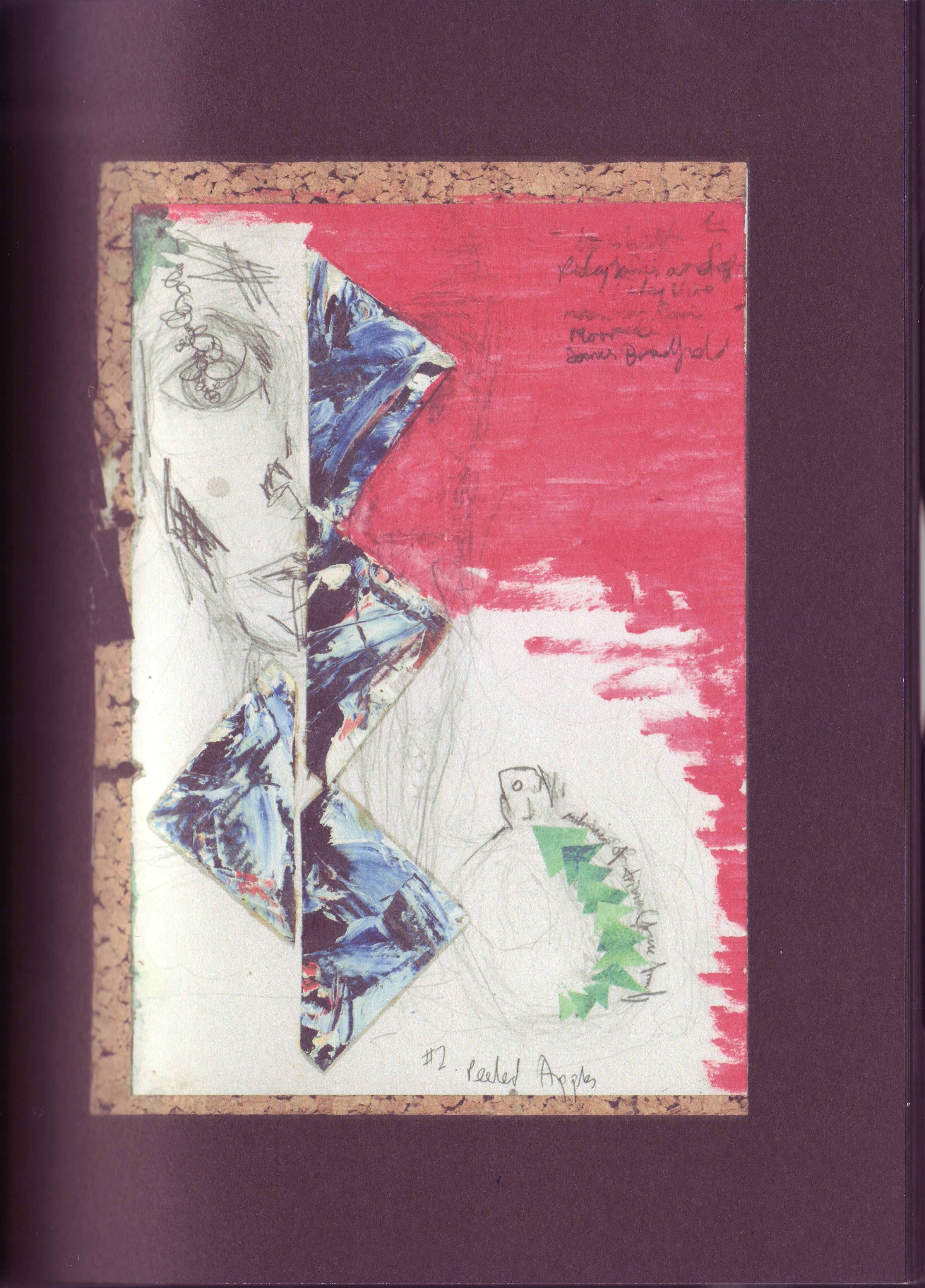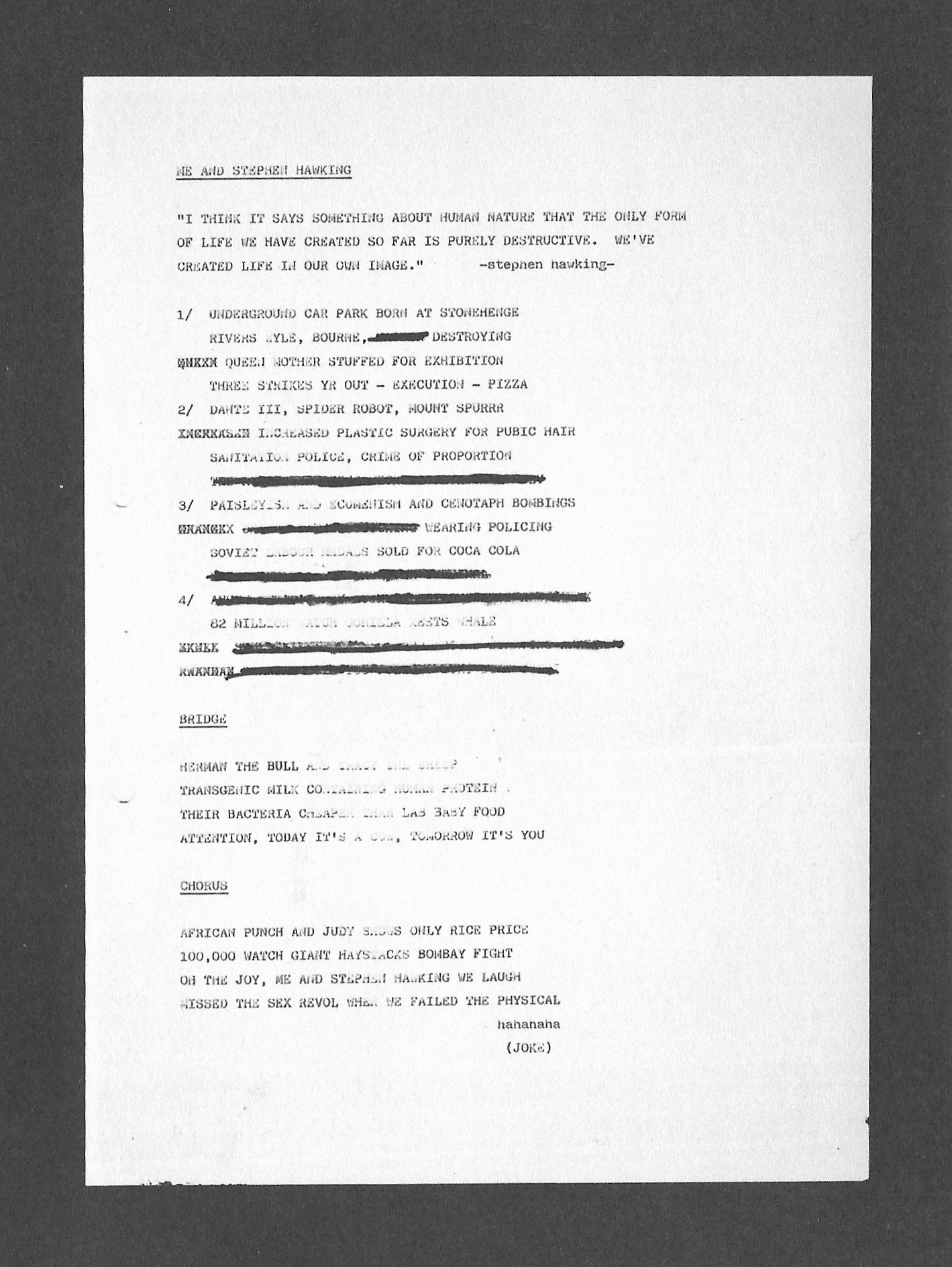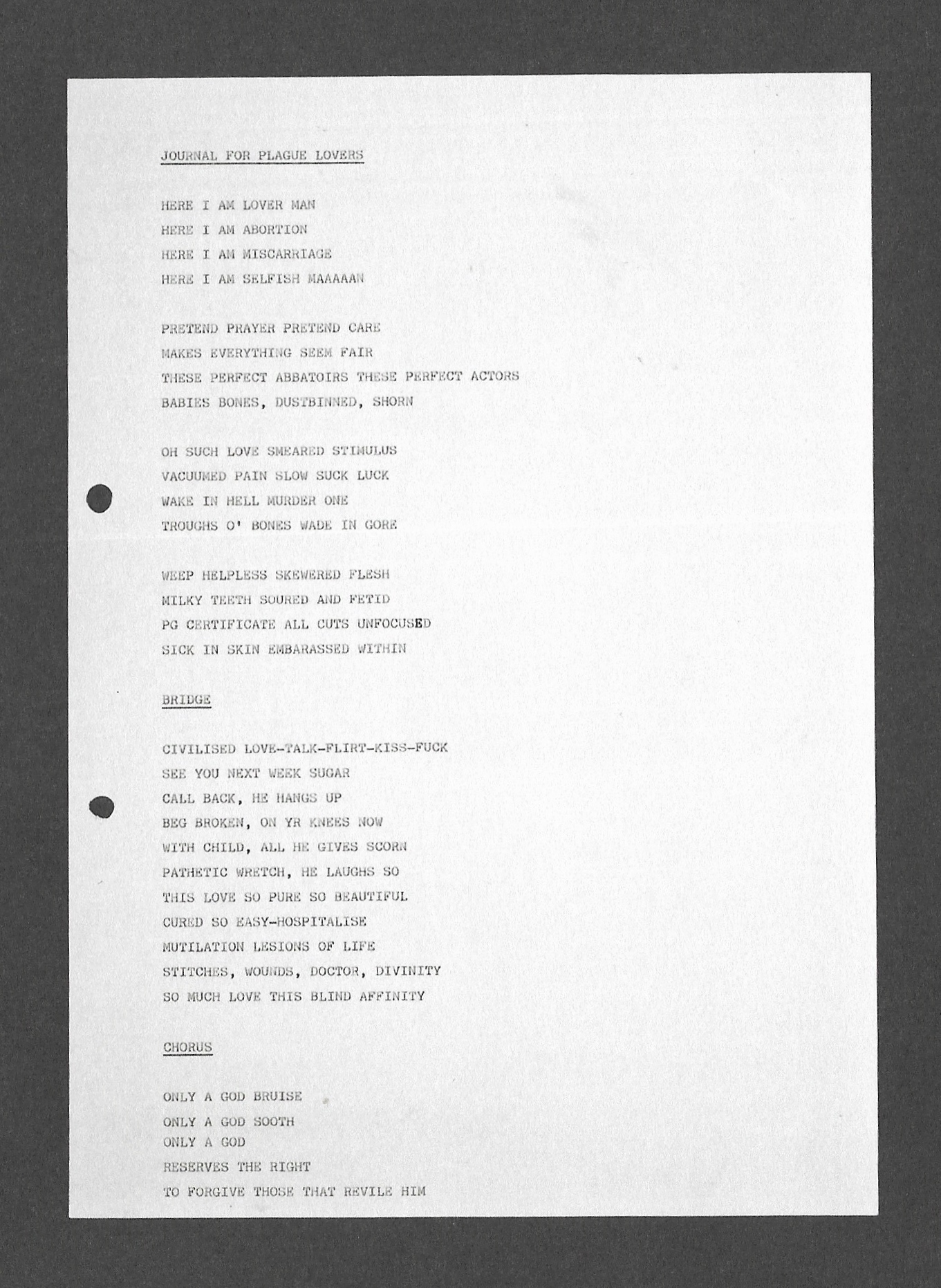Home
Reviews
Artist Pages
Playlists
Links
 2009, 14 years after the disappearance of guitarist and lyricist, Richey Edwards, the Manic Street Preachers would release an album feauturing
the lyrics and writing he left behind. This album is Journal For Plague Lovers. A Steve Albini produced, philosophical, culturally referential,
rock masterpiece. But what is it about this album that stands out so much against MSP's discography, particularly that which also features Edwards'
Lyrics?
2009, 14 years after the disappearance of guitarist and lyricist, Richey Edwards, the Manic Street Preachers would release an album feauturing
the lyrics and writing he left behind. This album is Journal For Plague Lovers. A Steve Albini produced, philosophical, culturally referential,
rock masterpiece. But what is it about this album that stands out so much against MSP's discography, particularly that which also features Edwards'
Lyrics?
The Manic Street Preachers, if you aren't familiar are a Welsh rock band that formed at the end of the 1980s and came to global prominence in the 90s. Their discography yet varied, can be divided into two categories, the three albums released prior to Richey Edwards' disappearance and then everything that came out afterwards. For some bands, the loss of a member does not particularly shape the music but this was not the case with the Manics. While I'm sure all members of the band would consider themselves to be political, none of them were particularly as outspoken as Richey. As the main lyricist for the band his political stances and worldview would become the bands 'style' and most recognisable part of their music at the start of their career. Richey's lyrics are deeply existentialist and openly discuss topics which would of certainly have been considered 'taboo' in 1990s Britian, such as prositution, The Holocaust and the death penalty. This 'outrageous' style would become the Manics trademark by the time their third and darkest album the The Holy Bible was released in 1994. Sadly, this would be Richey's last album offically part of the band as he would go missing in the next year. The Manics first album after Richey's disappearance would go on to be their best seller, 1996's Everything Must Go. Whilst the album did feature some of Richey's lyrics it was missing his existentialist and at times sardonic lyricism. This would be the last time they used Richey's lyrics until 2009 with the release of the subject of this review - Journal For Plague Lovers.

Manic Street Preachers, 1994
Content warning before we begin, this review will mention self-harm and eating disorders. Please consider how these topics will affect you before moving forward :)
Just before Richey went missing he gave Nicky Wire, bassist of the Manics, a folder of lyrics and other cultural observations; "Basically there was a big old binder with a picture of Bugs Bunny on the front and it’s just got ‘opulence’ scrawled on it and within that there are a lot of lyrics, pieces of prose, there are bits of JG Ballard, extracts from Kerouac, there are collages. It’s a very tactile piece of art. He gave that to me and he gave copies to James and Sean, facsimile copies, probably between three and five weeks before he disappeared." ¹ This folder would go on to become the basis for the lyrical content and album themes of Journal For Plague Lovers. Some pages of the orginal folder can be found alongside analysis on this website. (I hope to upload all my scans of the album here soon!) Now that the historical background is out of the way let's disscuss the album! (finally) Now, in my opinion Journal For Plague Lovers is a concept album, albeit an unconventional one but here me out. The concept the album explores is plainly an exploration of Richey's journal, and as the listener moves from song to song they are essentially flipping back and forth between pages. Like any good concept album the themes in this album go hard and by hard I mean there's about five and they don't cleanly fit into any boxes either. Based on my lyrical discection I've gathered that the main themes or images in the album are as follows; being a martyr, the desire for a life without choice, innocence, forgiveness (is it always possible?) and transformation of the self.The album begins with Peeled Apples, a song reminiscent of The Holy Bible, with its unapologetically strong drum beat and cutting lyricism. The song begins with a quote from the 2004 film The Machinist, which postdates Richey's journal and yet the films themes - guilt/forgiveness link incredibly well with the album. The quote from the film used - "You know so little about me. What if I turn into a werewolf or something?", actually introduces our first theme, transformation of the self... into a werewolf? Unlike the film, I find this quote quite funny and a bit stupid because of how emo it is, surprisingly this album 'has' quite a dry sense of humour and never takes itself to seriously, until well.. it does.. and then boom! you're in tears.
A lyric which really stands out to me in Peeled Apples is, "Bruises on my hands from digging my nails out". This line explicitly makes reference to Jesus' wounds from the crucifixion and could also suggest that the speaker is suffering from stigmata (the affliction of bodily wounds that corrospond to those caused by cruxifiction, many saints are said to have been stigmatics). This is not the only time stigmata is mentioned in the album with the lines "Bruised and nailed and quit...In silken palms that tear bone from skin" in This Joke Sport Severed and "Bleeding feet an angel's saviour" in Doors Closing Slowly. The comparisons to Jesus or other saintly figures have not been done in vain but rather refer to Richey's 'cruxifiction' by the ruthless 90s British press. His, often extreme actions, like carving 4-REAL into his arm mid-interview and claming that various bands were awful, were scruntinised to extreme by fans and press alike. Richey struggled with his role as a figurehead, made obvious through songs like 'Yes', from The Holy Bible, where he compares his life to that of a prositute, being exploited by in his case, the media.From the first song, the differences between JFPL and The Holy Bible are obvious but no two songs truly divide the two albums like the next songs - 'Jackie Collins Existential Question Time' and 'Me And Stephen Hawking'. Whereas both musically and lyrically Peeled Apples doesn't seem too out of place on The Holy Bible, Jackie Collins and Stephen Hawking would stick out like bright colours in a sea of black and grey. Both songs have incredibly absurd lyrics, truly highlighting Richey's rarely seen dry sense of humour and are set to almost poppy melodies. They are an incredibly refreshing insight into a lighter side of the band and are integral to the enjoyment of the album. Both songs have an air of innocence to them, particularly the lines "Oh mummy what's a sex pistol" in Jackie Collins and the references to childhood activities in Stephen Hawking - "Punch and Judy". A longing for innocence or a simpler life echo both in the albums lyrics and in the musical compositions, which are wistful and dreamlike at times. Track 3, This Joke Sport Severed the role of the persecuted much like in Peeled Apples, but the instrumental gives it an entirely different tone. This song almost acts as a respite for the more 'full on' songs we've had so far but also it's the Manics, they can never be too happy with just an acoustic guitar moment. As soon as the chorus ends we are greeted with a crescendo of strings, amplifying the intensity of the song and creating a majestic atmosphere. It's one my favourite moments in the album and really proves just how good the production is - it's intense and striking but not in an overwhelming way. The demo is really worth listening to as well because it has a really unique instrumental. You can listen here. And with the literal turn of pages we are on to the title track; Journal For Plague Lovers. On the surface JFPL is a classic Manics song, a catchy guitar melody alongside Shaun's strong yet complex drumming. The lyrics, however, are an incredibly intimate insight into Richey's relationship with God and the Christian faith.
The whole album is full of Christian imagery, something which was 'expected' by many Manics fans as it was rumoured that Richey had turned to faith during his hospitalisation for alcoholism and anorexia in 1994. However, the lyrics in JFPL do not show him exactly embracing the Christian faith and more question whether or not it can be used as a force for good, in his own life or in the lives of others. JFPL in particular puts Christianity under a magnifying glass and challenges those who use faith in place of a moral compass in their lives - "Doctored divinity, So much love this blind affinity" and "Only a God reserves the right to forgive those that revile him". However, instead of reviling the role of God in the lives of an individual, the song allows listeners to come to their own conclusions as to what it means to them. This questioning alone proves to me that Journal For Plague Lovers takes a more open-minded world view than that of The Holy Bible, which embodies Nietzsche's infamous quote that "God is dead". If the The Holy Bible encapsulates despair, then does it's spiritual sequel represent the life "on the other side of despair" that Jean-Paul Sartre spoke of? Personally, I think that this question can be answered with one quote from Peeled Apples - "Trespass your torments if you are what you want to be". The Christian imagery doesn't end here, see Doors Closing Slowly and All Is Vanity but I'll save those two for later. The next song is She Bathed Herself In A Bath Of Bleach, possibly my least favourite of the album but still worth discussing. This song is the final in a trilogy of Manics songs along with Little Baby Nothing and She Is Suffering. In lieu of a better title, let's call them songs that are about female suffering but are a bit clumsy in their approach. The song, at surface level, is about a woman refusing to leave a relationship that is literally killing her but has a bit of a double meaning when you consider Richey Edwards' battle with anorexia. By casting him as the "salmon pink skinned Mary still caring", lyrics like "Table for two, such a sweet delight" become much more ironic if you put an eating disorder in the place of the abuser. I find that I almost prefer the demo of this song to the original as I find the chorus alot more interesting. You can listen to the demo here.
now because this review is unbearably long I will be stopping here and adding a part two probably in a few days :) hope u look fwd to it



